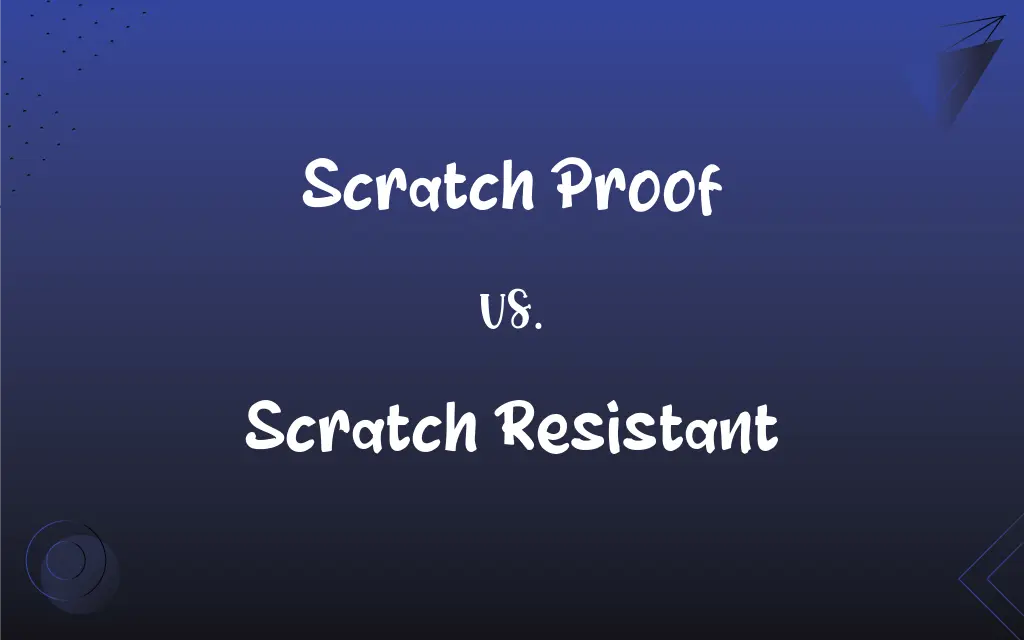Scratch Proof vs. Scratch Resistant: What's the Difference?
Edited by Aimie Carlson || By Janet White || Published on August 2, 2024
Scratch proof materials cannot be scratched under normal conditions, while scratch resistant materials are designed to withstand scratches better than standard materials but can still be scratched under enough force.

Key Differences
Scratch proof materials are engineered to be impervious to scratches, offering the highest level of protection against abrasion. Scratch resistant materials, while durable, can still succumb to scratches under certain conditions, particularly with heavy or sharp objects.
Products labeled as scratch proof are ideal for environments where there is a high risk of damage, such as protective screens for smartphones or lenses. Scratch resistant products are more commonly found in everyday items where some level of durability is beneficial, but absolute scratch immunity is not necessary.
The term scratch proof suggests a permanent feature of the material that prevents scratches from ever occurring. In contrast, scratch resistant implies a temporary or conditional resistance to scratching, which can degrade over time or under extreme conditions.
Materials classified as scratch proof often undergo rigorous testing to ensure they meet the criteria for being completely resistant to scratching. Scratch resistant materials are tested for durability as well, but the criteria are less stringent, focusing on reducing rather than eliminating scratch damage.
The choice between scratch proof and scratch resistant materials often comes down to the specific needs of the application and the expected level of wear and tear. Scratch proof is preferred for maximum protection, while scratch resistant offers a balance between durability and cost.
ADVERTISEMENT
Comparison Chart
Definition
Cannot be scratched under normal conditions
Designed to withstand scratches better than standard materials
Ideal Usage
High-risk environments
Everyday items where some durability is beneficial
Durability
Permanent scratch protection
Temporary or conditional resistance
Testing Criteria
Rigorous testing for total resistance
Less stringent, focuses on reducing damage
Cost
Typically higher due to advanced materials
More cost-effective with balanced durability
ADVERTISEMENT
Scratch Proof and Scratch Resistant Definitions
Scratch Proof
Scratch proof materials are completely resistant to scratches.
The scratch proof coating on the watch face has kept it pristine for years.
Scratch Resistant
Scratch resistant finishes are practical for everyday objects.
Choosing scratch resistant eyeglasses was a smart investment for durability.
Scratch Proof
Scratch proof surfaces remain unmarked by abrasion.
Our kitchen counters are scratch proof, enduring daily use without damage.
Scratch Resistant
Scratch resistant coatings offer added durability.
The scratch resistant finish on my car helps maintain its shine.
Scratch Proof
Scratch proof technology protects against all forms of scratching.
The new phone screen is scratch proof, surviving drops and keys in my pocket.
Scratch Resistant
Scratch resistant surfaces can endure minor abrasions.
Our scratch resistant dinnerware still looks new after years of use.
Scratch Proof
Scratch proof coatings ensure items retain their new appearance.
I chose scratch proof glasses to avoid constant replacements.
Scratch Resistant
Scratch resistant technology minimizes visible damage.
Thanks to its scratch resistant screen, my phone looks nearly flawless.
Scratch Proof
Scratch proof finishes are ideal for high-contact items.
This scratch proof luggage has traveled the world without showing wear.
Scratch Resistant
Scratch resistant materials are less likely to show scratches.
The scratch resistant floor handles pet claws well, showing minimal marks.
Scratch Proof
Unable to be scratched.
FAQs
What does scratch proof mean?
Scratch proof means a material cannot be scratched under normal usage conditions.
How are scratch proof materials tested?
Scratch proof materials undergo rigorous testing to ensure they meet strict durability standards.
Are scratch proof products more expensive?
Typically, yes, because scratch proof materials often require advanced technology or materials.
What is scratch resistant?
Scratch resistant refers to materials designed to minimize and withstand scratches better than standard materials.
Can I make a surface scratch resistant?
Yes, applying a protective coating can enhance the scratch resistance of many surfaces.
Are there scratch resistant coatings for smartphones?
Yes, many smartphones come with scratch resistant coatings, and additional protectors are available.
Can a scratch resistant item become less resistant over time?
Yes, the resistance can degrade with wear and tear or exposure to harsh conditions.
How do I know if a product is scratch proof or scratch resistant?
Check the product specifications or marketing materials for the manufacturer's claims about scratch resistance or proofing.
Can scratch resistant surfaces eventually get scratched?
Yes, scratch resistant surfaces can get scratched under enough force or sharp enough objects.
Do scratch proof and scratch resistant mean the same thing?
No, scratch proof implies no scratches can occur, while scratch resistant means scratches are less likely.
Are all scratch proof items completely immune to damage?
While scratch proof items are highly resistant to scratching, extreme conditions could potentially cause damage.
Is scratch resistance enough for everyday electronics?
For most users, scratch resistant coatings offer sufficient protection for everyday use.
Can scratch resistant glasses still get scratched?
Yes, they can get scratched if subjected to harsh abrasives or sharp objects.
Can scratch proof surfaces withstand all types of scratches?
They are designed to withstand everyday scratches but might not resist extreme abrasion or sharp objects.
Do car manufacturers use scratch resistant paint?
Yes, many cars are painted with scratch resistant coatings to maintain their appearance.
What materials are typically scratch proof?
Materials like certain ceramics, hardened glass, and advanced polymers are often used for scratch proof applications.
Is scratch proof or scratch resistant better for kitchen countertops?
Scratch resistant is typically sufficient, as it balances durability with cost and practicality for everyday use.
Can scratch resistance be applied to plastic?
Yes, special coatings can make plastic surfaces more resistant to scratches.
Is there a scratch resistance scale?
Some industries use the Mohs scale of mineral hardness as a reference for scratch resistance.
How important is scratch resistance for eyewear?
Very important, as it extends the lifespan and maintains the clarity of the lenses.
About Author
Written by
Janet WhiteJanet White has been an esteemed writer and blogger for Difference Wiki. Holding a Master's degree in Science and Medical Journalism from the prestigious Boston University, she has consistently demonstrated her expertise and passion for her field. When she's not immersed in her work, Janet relishes her time exercising, delving into a good book, and cherishing moments with friends and family.
Edited by
Aimie CarlsonAimie Carlson, holding a master's degree in English literature, is a fervent English language enthusiast. She lends her writing talents to Difference Wiki, a prominent website that specializes in comparisons, offering readers insightful analyses that both captivate and inform.






































































